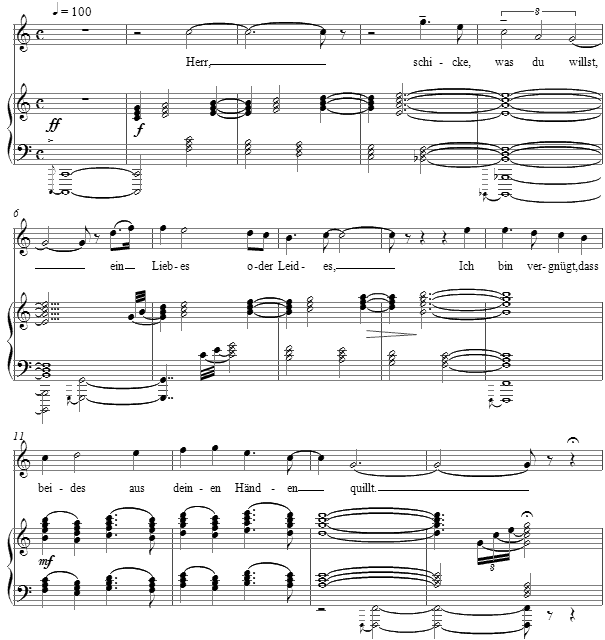Music and Texts of GARY BACHLUND
Vocal Music | Piano | Organ | Chamber Music | Orchestral | Articles and Commentary | Poems and Stories | Miscellany | FAQs
Gebet - (2007)
Eduard Mörike
for tenor and piano
Andreas Joost gewidmet
Herr, schicke, was du willst,
Ein Liebes oder Leides!
Ich bin vergnügt, dass beides
Aus deinen Händen quillt.
Wollest mit Freuden
Und wollest mit Leiden
Mich nicht überschütten!
Doch in der Mitten
Liegt holdes Bescheiden.[ 2 pages, circa 1' 50" ]
Eduard Mörike
German romantic poet Eduard Friedrich Mörike was born in Ludwigsburg, 1804, and died in 1875 in Stuttgart. He studied theology at the seminary in Tübingen, and followed the ecclesiastical career, becoming a Lutheran pastor. In 1834 he was appointed pastor of Cleversulzbach near Weinsberg, and, after his early retirement for reasons of health, in 1851 became professor of German literature at the Katharinenstift in Stuttgart. This office he held until his retirement in 1866; but he continued to live in Stuttgart until his death. Mörike is the most lyrically gifted of all the poets belonging to the so-called Swabian school which gathered round Ludwig Uhland. His poems, Gedichte (1838), are mostly lyrics, graceful in style, original in conception, often humorous, but expressed in simple and natural language. His lieder (songs) are of great purity of form and have been compared to those of Goethe. He also wrote a somewhat fantastic Idylle vom Bodensee (1846), and published a collection of hymns, odes, elegies and idylls of the Greeks and Romans, Klassische Blumenlese (1840), and several novels and narratives, among the novel Maler Nolten (1832), which enjoyed great popularity. Another work is the novella Mozart auf der Reise nach Prag (1856), a humorous examination of the problems of artists in a world uncongenial to art. Many of his lyrics were set to music by Hugo Wolf, as well as other composers of that era and later. Mörike's Gesammelte Schriften were first published in four volumes.
Lord, send what you will,
love or sorrow!
I am content that both
come from your hands.
Do as you wish with joy
and do as you will with sorrow
but do not lavish it on me!
Rather somewhere in the middle
is the best decision.
With such a direct appeal to God, a direct and "square" setting came to mind, in which the rising and falling parallel chords point metaphorically to the alternatives which we all face in life. Mörike pointedly is arguing with God, in the lengthy tradition of the biblical lawgivers and prophets.

Andreas Joost was born in 1963 in Kassel. He began his vocal studies at the Musikhochschule in Aachen and Köln, and since the 1994-1995 season he has been the first Spieltenor at Theater Aachen, having sung about thirty-fove operas and operettas. Joost has also appeared at the Teatro Arriaga in Bilbao, the Staatstheater Braunschweig, Oper Bonn, Staatstheater Mainz, and at the Staatstheater in Essen.
The score to Gebet is available as a free PDF download, though any major commercial performance or recording of the work is prohibited without prior arrangement with the composer. Click on the graphic below for this piano-vocal score.

